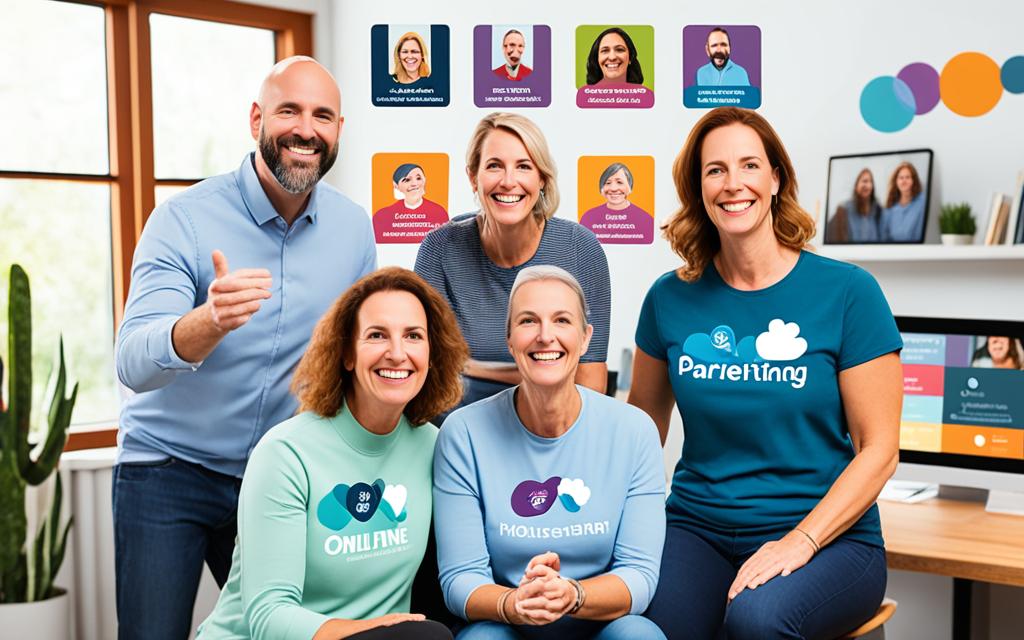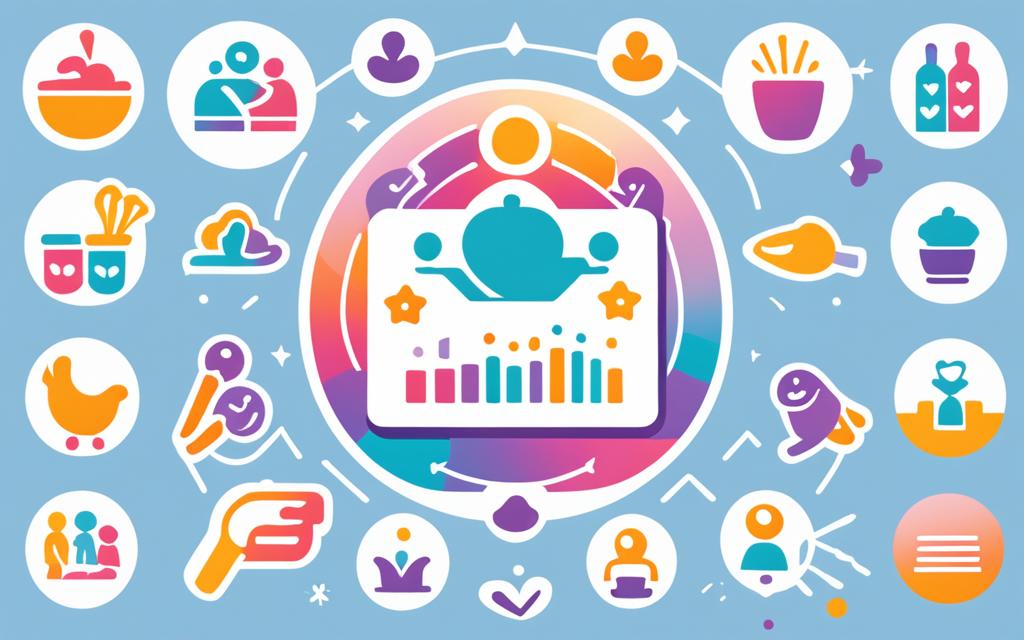Best Parenting Skills Training Program: Top Choices
As a parent, you want to help your child grow into a happy and successful person. Having the right knowledge and tools makes this goal achievable. The best parenting skills training program is essential for those ready to tackle parenting’s challenges gracefully. Such programs are your guide in the complex journey of raising children. They help create a supportive space for your kids.
Every child is one-of-a-kind, making a universal solution hard to find. However, parenting skills development arms you with vital skills for various situations. These programs prepare you to handle everything from toddler tantrums to your teen’s school stress. They are like a compass, guiding you through your child’s development stages.
Key Takeaways
- Discover the ingredients of a high-quality parenting skills training program.
- Uncover the transformative power of successful parenting strategies.
- Recognize the importance of ongoing parenting skills development.
- Explore how personalized programs can aid in meeting your family’s unique needs.
- Learn the value of investing in your parenting journey for long-term rewards.
Understanding Parenting Skills Training Programs
Exploring quality parenting programs can really open your eyes. It lets you use the most effective parenting techniques. You’ll discover the parts and big benefits of parenting skills training. This can change how you view raising kids.
What Constitutes a Parenting Program?
Knowing what is a parenting program means understanding its goals. It uses a clear plan to reach these goals. A parenting program helps parents or caregivers. It boosts their skills to support a child’s emotional, social, and brain growth. These programs offer specific tools for different stages of a child’s life, helping you as they grow.
The Benefits of Parenting Skills Training
Taking part in parenting skills training has many great benefits. It helps both the adult and child. You get better at talking with your child, solving problems, and understanding how kids grow. Using these skills can make a loving space. It helps kids and relationships grow well.
Here are the main benefits of parenting skills training listed in the table below. It shows how these programs make parenting better:
| Benefit | Description | Impact on Parenting |
|---|---|---|
| Enhanced Communication Skills | Teaches effective communication techniques for better understanding between parent and child. | Reduces conflicts and misunderstandings, fostering a tranquil home environment. |
| Behavioral Management | Provides strategies on managing child behavior proactively and positively. | Increases the use of constructive discipline, encouraging better behavior over time. |
| Emotional Resilience | Equips parents with tools to help children manage their emotions effectively. | Prepares children to face challenges more adeptly, boosting their overall emotional intelligence. |
Learning and using tips from a good parenting program can bring long-lasting rewards. It makes sure your kids get the support they need to succeed in all parts of life.
How to Improve Parenting Skills with Training
Boosting your parenting skills might seem tough, but it’s doable. With the right parent education courses and effective parenting techniques, big changes are possible. These courses give you knowledge and skills. They match today’s education strategies and developmental psychology.
Taking specific training can greatly improve parenting skills. You can learn new ways at your own speed. This is key for parents with busy schedules. These courses let you balance learning with your other duties.
| Technique | Description | Benefit |
|---|---|---|
| Consistent Routine | Training on establishing a consistent daily routine for children | Reduces anxiety and promotes security |
| Positive Reinforcement | Learning how to recognize and encourage desired behaviors | Enhances self-esteem and encourages good behavior |
| Emotional Coaching | Tools to help your child understand and manage their emotions | Improves communication and emotional intelligence |
| Boundary Setting | Guidance on establishing and maintaining clear boundaries | Develops respect and understanding of limits |
Joining parent education courses does more than just give you tools. It boosts your confidence too. By using these effective parenting techniques, your relationship with your kids and family life will greatly improve.
What is the Best Parenting Skills Training Program
Looking for the top parenting skills training program? You’ll need clear criteria to make the right choice. It’s important to match the program with your parenting style. It should also improve your skills effectively.
Criteria for Evaluation
Assessing a parenting program takes careful thought. Consider the program’s approach, the teachers’ credentials, its ease of access, and past participant reviews. These factors help decide if it’s the right fit for your family.
Comparing Top Programs
It’s helpful to compare major parenting programs on different points. This comparison addresses various parenting issues. Here is a detailed look to aid your decision.
| Program | Focus Area | Methodology | Participant Feedback |
|---|---|---|---|
| Positive Parenting Program | Behavioral Techniques | Evidence-based | Highly positive |
| Family First | Family Communication | Interactive Workshops | Very good |
| Parenting Success Network | Early Childhood Development | Series of Seminars | Excellent |
Choosing the best parenting training program takes detailed examination. Use solid evaluation standards, and compare leading programs. This approach ensures you find a program that meets your needs and strengthens your parenting.
Top Parenting Programs for New Parents
Starting your journey as a parent is big. Finding the right support makes all the difference. Top parenting programs mix expert advice with key tips for new moms and dads. They focus on helping your baby grow and making becoming a parent easier.
Programs Focused on Infant Development
There are programs just for your baby’s growth. They teach you how to feed your baby right and spot when they hit new skills. This knowledge helps your baby develop in the best way.
Training for the Transition to Parenthood
Becoming a parent feels huge, but the right training helps. Topics like staying strong, managing time, and lowering stress are covered. They give you tools to face the ups and downs of parenting.
| Program Name | Focus Area | Program Length | Key Features |
|---|---|---|---|
| Baby Steps | Infant Development | 6 months | Bi-weekly sessions, personalized support, milestone tracking |
| New Parents Network | Transition to Parenthood | 3 months | Community forums, expert Q&A, stress management workshops |
| Growth Journey | Overall Early Parenting | 1 year | Comprehensive coverage from birth to first year, continuous assessment |
Effective Parenting Techniques from Experts
In our fast-changing world, knowing how to raise happy, balanced kids is crucial. Experts share key parenting tips focusing on discipline, communication, and emotional smarts in kids.
Discipline Strategies and Communication
Discipline isn’t about punishment. It’s about guiding and teaching. Effective methods are consistent and fair, helping to build respect and understanding. Communication is key.
It’s essential to listen to your child and address their feelings. This promotes open talks. It doesn’t just fix behavior but strengthens your bond.
Nurturing Emotional Intelligence in Children
Emotional intelligence means understanding and managing our emotions and empathizing with others. Boosting this in kids is a top parenting strategy. It teaches them to express their feelings, comprehend others’ emotions, and handle intense feelings.
- Model emotional intelligence by managing your own emotions healthily.
- Encourage conversations about feelings in everyday situations.
- Validate their feelings, showing that all emotions are okay to experience.
Starting young in developing these skills promotes empathy, resilience, and emotional awareness. These are key for success in life and work.
| Technique | Benefits | Age Group |
|---|---|---|
| Consistent Discipline | Builds understanding and respect | 3-12 years |
| Active Listening | Enhances communication and trust | All ages |
| Emotion Labeling | Improves emotional intelligence | 2 years and up |
Using these effective parenting techniques and teaching discipline strategies and emotional intelligence can greatly improve family life and help your kids thrive as adults.
Parenting Skills Development for All Ages
As children grow, you need to change your parenting strategies to match their stages of development. It’s crucial to notice these changes and be ready with the right parenting skills development.
From toddlers to teens, each phase in a child’s life brings its own challenges and key moments. Knowing these stages helps you pick the best parenting methods.
| Age Group | Focus Areas | Recommended Strategies |
|---|---|---|
| 0-2 years | Attachment and Trust | Consistent routines, responsive caregiving |
| 3-5 years | Social Skills | Play-based learning, structured social interaction |
| 6-12 years | Academic and Emotional | Support with schoolwork, emotional coaching |
| 13-18 years | Independence and Identity | Open communication, encourage self-expression |
You must tailor your parenting skills development to meet your child’s changing emotional and intellectual needs. This approach is key to successful parenting strategies. It helps create a secure, supportive, and positive environment for children of all ages.
Best Practices in Parenting Across Cultures
Parenting is a journey we all share, but it looks different for everyone. This difference comes from our cultural backgrounds and what we value most. Even though practices vary, some key principles of raising kids stay the same. These principles provide a guide that fits many family situations and values.
Adapting Parenting to Your Family’s Values
Making your family’s core values a big part of how you raise your kids is key. These values could come from your culture, your own beliefs, or both. They influence how you make choices for your kids and guide them. It’s essential to talk about these values clearly and often. This way, your parenting matches your heritage and personal views.
Universal Principles of Child Rearing
Parenting styles change from culture to culture. Yet, some key principles work well everywhere. These include showing love no matter what, being there for your kids, pushing them to learn, and helping them become independent. Using these basic ideas helps raise well-rounded kids, no matter the cultural details.
Below, we show how different cultures use these key child-raising ideas. They tweak them to fit their unique values and social rules.
| Culture | Core Family Value | Parenting Practice | Universal Principle |
|---|---|---|---|
| American | Independence | Encouraging self-reliance from a young age | Fostering independence |
| Japanese | Community Harmony | Teaching children to value group over self | Providing support and safety |
| Indian | Respect for Elders | Instilling reverence for family hierarchy | Show unconditional love and respect |
| Brazilian | Socialization | Encouraging early social interactions at family gatherings | Encouraging education and learning through social contexts |
We aim to create a parenting style that respects family values. At the same time, it should follow the best practices in parenting. This style celebrates cultural differences while sticking to core child-rearing principles. This approach helps make a safe, loving environment. It also prepares your kids for a world that’s more connected.
Online Parent Education Courses and Their Impact
Online parent education courses are changing how we get parenting help. They offer flexible and easy-to-access information. This is perfect for today’s busy parents. These digital platforms allow parents to learn and find support in new ways.
Convenience and Flexibility of Digital Learning
These courses are super convenient. They let parents learn whenever they can, fitting into their packed schedules. You can study early in the morning or on your lunch break. There’s no need to be in a classroom.
This makes learning about parenting easier than ever. You can learn at your pace and when it fits your life. This freedom is a big plus.
Interactive Learning and Community Support
Online courses aren’t just about reading. They have forums, live Q&A sessions, and group chats. These help you learn better and connect with other parents.
Being part of a community lets you share stories and advice. This makes learning more hands-on. It also means you’ve got friends who understand what you’re going through.
- Real-time interactions with experts
- Opportunities to ask questions specific to your unique situation
- Access to a network of parents facing similar challenges
- Continual availability of resources and materials online

Hands-on Parenting Workshops and Seminars
Joining hands-on parenting workshops and seminars lets you dive into experiential learning. These programs offer real-life experiences and professional advice. You’ll get practical insights right away.
Experiential Learning Techniques
Mastering parenting skills is easier with experiential learning. Parenting workshops use methods like role-playing, solving problems on the spot, and group talks. You get to practice what you learn, making it stick.
Immediate Feedback from Professionals
At parenting seminars, experts give you quick feedback. They help with discipline or bonding with your kids. You’ll learn how to tweak your parenting style right there.
| Technique | Description | Benefits |
|---|---|---|
| Role-Playing | Participants act out various parenting scenarios to understand different perspectives. | Improves empathy, response strategies, and communication skills. |
| Problem Solving Sessions | Group-based challenges that involve finding solutions to common parenting issues. | Enhances creative thinking and collaborative skills. |
| Interactive Discussions | Guided talks led by experts, focusing on relevant parenting topics. | Promotes knowledge exchange and community support. |
Integrating Successful Parenting Strategies into Daily Life
Adding successful parenting strategies to your day can make your family more harmonious. It can also help your kids grow in a healthy way. By sticking to simple daily routines and solving conflicts well, you create a structured space. This space is good for well-being and emotional growth.
Creating Routines that Work
Setting up daily parenting routines sets clear rules and makes things stable for kids. Being consistent with things like meals, homework, and sleep helps kids feel safe. It teaches them discipline and responsibility. Try these strategies in your daily life:
- Morning routines that prep for a great day (e.g., healthy breakfast, reading time).
- After-school routine that balances play and planned activities.
- Evening routine that strengthens family ties and readies for bedtime.
Effective Conflict Resolution
Getting better at conflict resolution leads to calmer, more helpful family talks. Handling disagreements in useful ways is key to keeping a loving home. It also teaches your kids important social skills. Here are some tips:
- Really listen to what each family member is saying.
- Work together to come up with solutions to problems.
- Stay calm and use kind words, even when upset.
Below is a table showing how to use these techniques in common situations:
| Scenario | Technique | Outcome |
|---|---|---|
| Sibling rivalry over toys | Guide them to take turns and share | Teaches sharing, lowers fights |
| Disagreement on screen time limits | Discuss and agree on rules | Boosts responsibility and teamwork |
| Homework responsibilities | Set a clear routine with expected rules | Better study discipline and time management |
Using these successful parenting strategies is not just about rules. It’s about building a family culture of respect, teamwork, and understanding. By working on daily routines and conflict resolution, you create a loving, stable home. This supports your children’s growth and well-being.
Comprehensive Parenting Courses for Special Needs
Raising kids is hard, but it’s even tougher if your child has special needs. Luckily, there are parenting courses designed just for you. These courses cover the unique challenges you’ll face. They also help create a community where you can find support and friendship.
Addressing Unique Challenges
Kids with special needs are all different. They may struggle with things like moving around or learning new stuff. Specialized parenting programs give you the right tools to help your child. You’ll learn how to communicate better, manage behavior, and even use therapy techniques.
Building a Supportive Community
Having people who get what you’re going through is vital. By taking these courses, you join a group of parents just like you. This becomes a place to swap stories, tips, and get the push you might need. You’re not alone on this parenting path.
To wrap it up, these courses are super helpful. They’re packed with skills to help you and provide the support you need. They make sure you and your child are set up for success.
Choosing the Right Parenting Program for Your Family
Choosing the right parenting program can feel overwhelming. Yet, by considering your family’s needs and the different ways to teach, you can find the perfect fit. This choice can boost your family’s growth and unity.
Assessing Your Family’s Needs
Every family is one-of-a-kind, facing their own set of challenges and goals. Begin by pinpointing what you need most. Whether it’s dealing with toddler tantrums, teenage angst, or improving how your family talks, knowing this helps select the right program.
Understanding Different Teaching Methodologies
Parenting programs offer various ways to learn. Some use interactive workshops, while others have lectures or use videos and pictures. It’s important to think about which way of learning you like best. Choosing a program that fits your style can make learning more effective and enjoyable.
| Methodology Type | Features | Best for Families Needing |
|---|---|---|
| Interactive Workshops | Hands-on activities, role-playing, real-time feedback | Practical application, behavior management strategies |
| Lecture Series | Informational sessions, expert speakers, Q&A opportunities | Foundational knowledge, diverse topics coverage |
| Multimedia Presentations | Videos, animations, graphical data | Visual learners, engaging younger participants |
When choosing, think about how a program’s teaching methods will fit your family’s needs. The best program should teach and inspire positive change in your family.
Evaluating the Effectiveness of Parenting Skills Programs
In our fast-paced world, the role of parenting programs is under more review. It’s vital to evaluate parenting skills programs carefully. This ensures they genuinely help in raising capable future adults.
Measuring Success Outcomes
To truly know if these programs work, we must look at various signs of success. We use numbers to see changes in kids’ behaviors, grades, and feelings. Parents also share how they’ve grown and improved in parenting. These insights help us see the immediate positives of learning parenting skills.
Long-term Benefits for Parents and Children
Joining these programs helps not just now, but for years to come. Parents talk about better talking with their family, stronger bonds, and feeling better about their parenting. Kids benefit from having good friends, feeling good about themselves, and doing well in school as they grow.
- Better conflict resolution skills within the family
- Increased parental engagement and understanding
- Improved mental health outcomes for children and adults alike
By looking at both short-term achievements and long-term benefits, we can truly understand if parenting skills programs work. This way, programs meet immediate needs and also create a better future for families.
Testimonials and Success Stories from Parents
Parenting skills training programs show their value in real stories from parents. These stories prove the programs work and lead to big changes in families.
Real-life Experiences and Outcomes
Parents tell us how joining parenting programs changed their lives. They talk about better talking and understanding within the family. They also learn to solve problems better, discipline in effective ways, and truly get what their kids need.
One parent said, “The things I learned made me connect better with my kids. Our home is now more peaceful.”
How Programs Have Changed Families
The good effects of better parenting spread through the whole family. Parents say it leads to stronger bonds between siblings and a happier home.
| Before Training | After Training |
|---|---|
| Frequent conflicts | Improved conflict resolution |
| High stress levels | Reduced stress, better coping mechanisms |
| Lack of communication | Open, effective communication |
| Unclear boundaries | Well-established rules and boundaries |
| Parental inconsistency | Consistent parenting approach |
These stories and testimonials show deep, positive changes in families thanks to these programs.
Cost-Benefit Analysis of Parenting Skills Training
Understanding the financial side and long-term gains of parenting programs is key for your family. It’s important to see how spending money on learning parenting skills can bring big benefits. These benefits help both kids and adults in the family.
Investing in Future Generations
Investing in the future is not just about doing what’s right. It’s a smart move for a child’s growth in many areas. Good parenting programs teach you to support your child’s growth milestones. These skills help your child throughout their life, cutting future costs on education help, discipline, or health care.
Comparing Costs and Flexible Payment Options
In today’s economy, having different ways to pay is as important as the training content. Many top parenting programs offer various payment plans. They help ease financial stress while keeping the programs easy to join. Here’s a look at what parenting training might cost at different levels:
| Program Type | Cost | Payment Plans Available |
|---|---|---|
| Entry-Level Online Courses | $100 – $200 | Single Payment, Monthly Installments |
| Comprehensive Workshops | $500 – $1,000 | Split Payment, Quarterly Installments |
| Advanced Individual Coaching | $1,000 – $5,000 | Monthly Installments, Annual Subscription |
Looking closely at both the clear and hidden benefits of parenting programs against their costs and flexible payment options helps you decide wisely. This decision doesn’t just help your family now but also future generations.
Conclusion
As our journey on successful parenting strategies ends, we see that true parenting shines through commitment, knowledge, and adaptability. Searching for the best parenting skills training program is a path to creating a supportive space for your child’s growth. We’ve looked at how these programs can boost your child’s emotional smarts and how to blend the best tactics from various cultures to improve your bond with your child.
The choice of the right program depends on careful research and knowing what’s available. You might consider online courses for flexibility or workshops for direct feedback. This choice greatly shapes your child’s future. By embracing lifelong learning and choosing successful parenting strategies that fit your family, you make a big difference.
Take time to think about the advice and ideas we’ve shared. Consider different programs and their effects on your parenting and your child’s growth. Investing in a best parenting skills training program offers great benefits. It helps raise children who are ready to face the future with confidence, empathy, and smart thinking.
FAQ
What constitutes a parenting program?
A parenting program offers a series of lessons or workshops. It teaches about raising kids well. You learn about child growth, talking to kids, setting rules, understanding feelings, and more. These skills are key to bringing up children.
What are the benefits of parenting skills training?
Training helps you understand your child better and discipline them right. It improves how you talk to your kids and helps you and your child get along better. Parents learn how to overcome various parenting challenges with confidence.
How can parent education courses improve parenting skills?
These courses provide tested advice and tips for better parenting. They show you how to set good daily habits, promote your child’s growth, and solve conflicts. This guidance is practical for all parents.
What criteria should I consider when evaluating parenting skills training programs?
Look at the program’s fit for your family, the teachers’ qualifications, and if the lessons are based on solid research. Check if the times work for you and if you can meet other parents there.
Which top parenting programs are recommended for new parents?
Choose programs that focus on caring for babies and getting used to being a parent. These programs support new parents. They help them adapt and ensure their baby grows up well and happy.
What successful parenting strategies can help in nurturing emotional intelligence in children?
Show emotional intelligence yourself, and talk about feelings openly. Teach your child to solve problems and understand others. Be a good role model when it comes to handling feelings. Create a space where expressing emotions is valued.
How does parenting skills development evolve with children’s ages?
As your child grows, your parenting needs to change. In the early years, it’s more hands-on. But as your child gets older, you guide them more and encourage independence. Safety and good choices are always important.
Can you adapt parenting to your family’s values while considering universal child-rearing principles?
Yes, you can blend your cultural values with proven parenting principles. Things like kindness, rules, and good communication work in any culture. They help children from all backgrounds grow up well.
How do online parent education courses impact learning and community building?
These courses are flexible, perfect for busy parents. They often have interactive parts and forums. Here, parents can help each other, building an online community of learners.
What are the advantages of attending hands-on parenting workshops and seminars?
In-person events let parents try out techniques and get instant advice. They can also meet other parents and experts face-to-face. This interaction is a big plus.
What daily routines contribute to successful parenting strategies?
Good routines make your child feel safe. They know what’s happening next. This includes when they eat, sleep, study, and play. These habits cut down stress at home.
What should I look for in parenting courses for special needs children?
Find courses taught by experts in special needs. They should offer advice suited to your child’s abilities. These programs also help build a community that gets what your family is going through.
How do I choose the right parenting program for my family?
Think about what your family needs and wants. Pick programs that match these. Also, consider the practical details like where it’s at, how long it takes, and the cost.
How can one evaluate the effectiveness of parenting skills programs?
Look for improvements like better talking with your child, fewer behavior problems, and happy feedback from kids and teachers. Also, stronger family bonds and happier kids and parents are good signs.
Where can I find real-life testimonials from parents about parenting programs?
Check the program’s website, social media, or review sites for parent stories. Talking to other parents in communities can also give you honest opinions about the programs.
How should I approach a cost-benefit analysis of parenting skills training?
Balance the benefits, like more confidence and better child growth, against the costs. Investing in parenting skills pays off for your family. Also, see if there are ways to make it more affordable, like scholarships.







